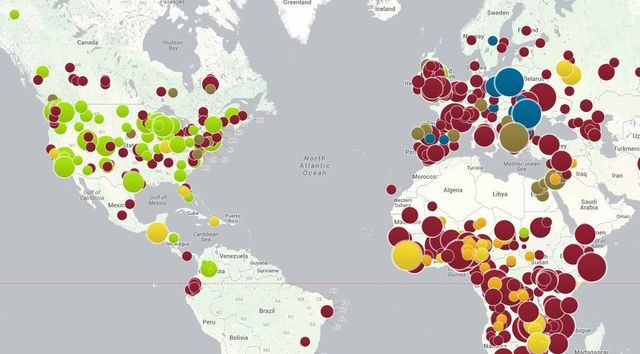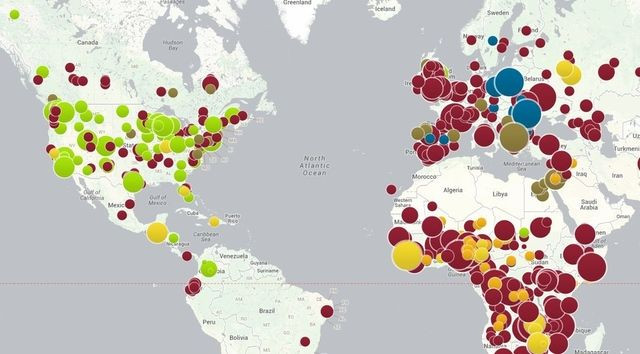Map Shows Anti-Vaccine Movement's Impact On Public Health In U.S., Europe

A graphic illustrating the alarming rise in preventable infections in the U.S., UK, and other countries shows the true impact of vaccine resistance — a movement fueled by a set of fears health authorities say founder on science as well as reason.
The Council of Foreign Relations’ (CFR) interactive map shows that measles, rubella, whooping cough, and other preventable diseases continue to plague nations where the right vaccine is widely available and often mandatory. Since 2008, needless epidemics have been recorded across the developed world, with cases clustering around the U.S. and the UK. The reason is to be found at the fringes of public health, where an increasingly vociferous movement continues to advance the claim that current immunization schedules are to blame for the rise in autism rates.
The Impact of Vaccine Resistance
Although autism rates have continued to rise in the face of vaccine resistance, adherents stick to the authoritatively rejected findings of Andrew Wakefield — a former British physician and surgeon, who in 1998 published a paper purporting a link between the MMR vaccine and autism incidence. The paper, which was later retracted, eventually led to a well-publicized investigation that culminated in Wakefield being stricken off the UK’s Medical Registry in 2010. Four years later, his research continues to fuel a widespread resistance that threatens to unravel domestic disease control and expose the public to pathogens that should no longer be a problem.
“Immunization counts among the greatest advances in the history of public health, sparing us torments and calamities that have literally plagued prior generations- from smallpox and polio, to mumps and measles,” Dr. David L. Katz, director of the Yale University Prevention Research Center, wrote in an email to Medical Daily. “Reticence about immunization and associated conspiracy theories are the misguided indulgence of societies no longer subject to the scourges vaccines prevent.”
Like many other experts, Katz’s characterizes the resistance as a troubling by-product of a scientific triumph. As effective immunization schedules suppress the incidence of devastating diseases across the developed world, the former threat of infection is gradually erased. In the public eye, the vaccine is no longer a cure, but a substance administered and controlled by government agencies. “We are, for the moment at least, privileged with the liberty of debating the vaccine issue,” Katz said. “If we were mired in an influenza pandemic and counting casualties by the day, we would quickly lose our reticence about the test tube in which a remedy was cultivated.”
As a seemingly anonymous yet ubiquitous part of society, immunization naturally lends itself to some of our more draconian flights of fancy — not just because of the rhetoric of Wakefield, Jenny McCarthy, and organizations like Autism Action Network, but also because such conspiracies have turned out to be true in the past. One example is the shockingly irresponsible gambit played by the CIA in 2011, when intelligence officers used a fake vaccine campaign to gather DNA evidence of Osama bin Laden’s whereabouts from the public. For families stricken with a developmental disorder that still evades clear diagnostic and preventative guidelines, these stories conjure a series of unnerving pitfalls across the public health landscape.
Autism and Vaccines
But, as Katz’s points out, the issue soon becomes a matter of ideology over epidemiology, as an overwhelming amount of scientific evidence backs the continued application of our current immunization schedules. To deny the benefits of vaccines, he says, is to allow personal anecdotes and observations to trump conclusions arrived at through empirical inquiry. And when that happens, views soon become impervious to the analytical tools that once hauled us out of geocentrism, theocracy, and other consequences of poor scholarship.
When objectivity becomes entangled with ideology, it is sometimes useful to imagine a moment of absolute silence, during which only the world is permitted to speak. If we strip the debate of everything but its observed outcomes, we find that the state of affairs has not improved one bit with the rise of vaccine resistance. Hopefully, the graphic below will make this clear.

[Interactive graphic via Council on Foreign Relations]



























